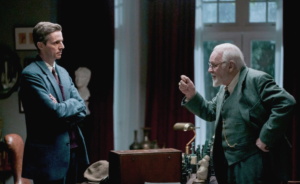MAESTRO reviewed by GREG KING
Director: Bradley Cooper
Stars: Carey Mulligan, Bradley Cooper, Matt Bomer, Sarah Silverman, Maya Hawke, Michael Urie, Brian Klugman, Sam Nivola.

Leonard Bernstein was, arguably, the best-known American composer and conductor of the twentieth century. His achievements included 7 Emmy Awards, 2 Tonys, 16 Grammys, and 1 Oscar nomination. He is best known for composing works for Broadway musicals, including the score for the classic West Side Story. He also composed the score for the 1954 film On The Waterfront. He was the music director for the New York Philharmonic Orchestra, making his debut as conductor at Carnegie Hall in 1943 when he was just 25. Bernstein also brought classical music to the masses through his regular broadcasts and Young Peoples’ Concerts.
However, audiences flocking to see this biopic of Bernstein will actually learn little of this from director Bradley Cooper’s film. This ambitious and unconventional biopic marks his sophomore directorial effort following his superb remake of A Star Is Born, and here he demonstrates much more confidence behind the camera. At one stage Martin Scorsese and Steven Spielberg were attached to direct the film, but after seeing a rough cut of A Star Is Born both legendary filmmakers agreed that Cooper should helm this biopic.
Working with co-writer Josh Singer (the Oscar winning Spotlight, etc) Cooper takes a more impressionistic take on the material and rather than follow the more traditional route the film focuses mainly on his relationship with noted Chilean-born theatre and television actress Felicia Montealegre Cohn (played here by Carey Mulligan), whom he married. She was very much his equal, and fittingly the film explores their complicated relationship while his career takes a bit of a backseat. Bernstein was also bisexual and carried on many affairs with younger men, but Felicia tolerated these affairs as long as he remained discreet.
The film unfolds at a hectic pace and glosses over many of Bernstein’s more significant achievements to concentrate on his personal relationship. Cooper makes some bold stylistic choices here, choosing to film in the boxy Academy ratio for some scenes, which gives it a more intimate feel. He has also shot those sequences set in the 40s and 50s in black and white to evoke the era, while those scenes set in the 60s and beyond are shot in colour. The cinematography from Matthew Libatique (who also shot Cooper’s A Star Is Born) is superb and atmospheric. The production values are excellent and capture the various eras faithfully, and the period details reek of authenticity.
The soundtrack uses plenty of Bernstein’s music, and over the final credits there is some archival footage of him conducting an orchestra with his usual passion and theatrical flair.
Cooper immerses himself in the role of Bernstein and his sublime performance captures much of that sense of manic energy and passion, but he also brings to light his character flaws and weaknesses and his inner turmoil as he wrestles with his personal demons. A standout scene recreates Bernstein directing an orchestra in Ely Cathedral, and here Cooper captures much of legendary conductor’s mannerisms and flair during this impressive six-minute take.
The film is also as much about Felicia as it is about Bernstein, and fittingly Mulligan is superb in the role. She is a force to be reckoned with, and Mulligan delivers a nicely nuanced performance as her character gets the big emotional arc. She more than matches Cooper every step of the way and the pair create a dynamic chemistry. The film features a great ensemble supporting cast, but Matt Bomer, Sarah Silverman and Maya Hawke (daughter of actor Ethan) stand out.
Maestro offers a stark contrast to last year’s Tar, which was an in-depth look at the life of a fictional conductor as their career and reputation imploded.
Produced by streaming giant Netflix, Maestro is another winner from Cooper who reveals himself as a great filmmaker, and we can expect it to feature prominently during the awards season.
★★★★



